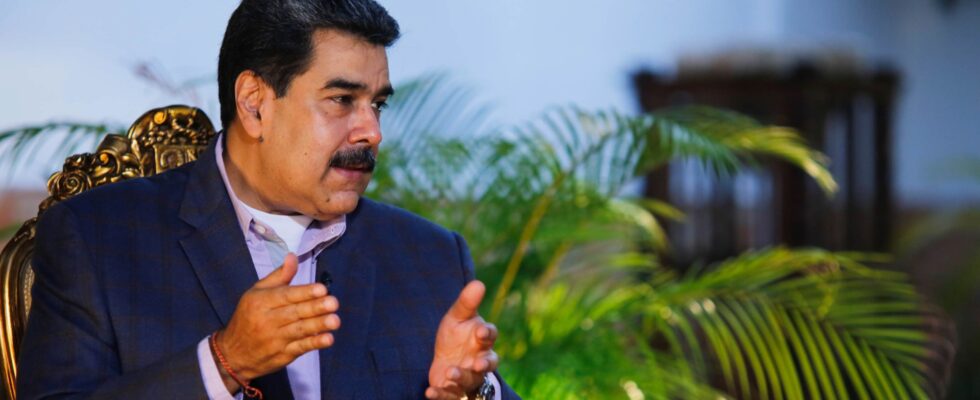The President of Venezuela Nicolas Maduro, elected since 2013, but whose legitimacy of re-election in 2018 is contested by more than 60 countries, is officially a candidate for a third term during the presidential election on July 28. The United Socialist Party (PSUV), of which he is president, “decided by acclamation, by consensus, that the candidate of the Bolivarian revolution is Nicolas Maduro”, declared the vice-president of the party, Diosdado Cabello, considered the number 2 from power during a party congress on Saturday in Caracas.
“Let’s move towards a new victory,” declared Nicolas Maduro shortly after when accepting his inauguration. “There is only one destiny here: popular victory,” he said receiving a PSUV flag from Diosdado Cabello: “Here is your party, the party of Commander (Hugo) Chavez.”
60 countries did not recognize the legitimacy of his re-election in 2018
Nicolas Maduro, 61, is the heir of “Chavismo”, the doctrine of his predecessor Hugo Chavez (1999-2013) for a “socialism of the 21st century” based on nationalizations, a strong presence of the State and the military apparatus. More than 60 countries, including the United States and those of the EU, did not recognize the legitimacy of his re-election in 2018, boycotted by the opposition, and tried in vain to recognize the opponent Juan Guaido, then head of Parliament, as interim president.
Despite international sanctions in the hope of overthrowing him, he managed to stay in power, denouncing American “blackmail” and strengthening his link with Russia. Hugo Chavez at the time supported Moscow during the war in Georgia in 2008, and Nicolas Maduro has repeatedly expressed his support for the Russian head of state, Vladimir Putin, before and after the start of the war in Ukraine.
His presidency is marked by a broad collapse of the economy in ten years in a country with some of the largest oil reserves in the world, the exile of more than seven million Venezuelans fleeing hunger and poverty, and allegations of human rights violations.
Rivals declared ineligible
The legitimacy of this presidential election once again arises, while the main opponents have been dismissed by the courts, accused of being at the orders of those in power. Henrique Capriles, a two-time former presidential candidate, and Maria Corina Machado, who handily won the opposition primaries in October, were declared ineligible on charges they dispute.
However, the weight of American sanctions on Venezuelan oil may have for a time raised hopes of “transparent” elections, to which the opposition called. An agreement signed in Barbados in October provided for the presence of international observers and the possibility of opposition candidates declared ineligible to be able to challenge the court decision. Alas, the Supreme Court confirmed in January the 15 years of ineligibility imposed on Henrique Capriles and Maria Corina Machado.
A stratagem that the Chavista power has already used in the past, both at the national and local level, to remove rivals.
“We are stronger than ever”
The United States, which eased its sanctions following the Barbados agreement, has threatened not to renew a license authorizing the purchase of oil and gas when it expires in April “in the absence of progress (…) in particular to allow all candidates to compete in the presidential election.” For Norway, mediator between opposition and government, it is “fundamental” that the Barbados agreement applies. But time is on Nicolas Maduro’s side.
By setting the elections at the beginning of the month for July 28, the birth date of Hugo Chavez, the National Electoral Council (CNE) leaves little time for appeals. The official closing date for registrations for candidates has been set for March 25. And on Friday, Luis Ratti, a Venezuelan politician accused of being a power submarine, asked the Supreme Court to veto the participation of the main opposition coalition in the election.
Maria Corina Machado nevertheless wants to believe in the popular momentum that seems to accompany her in each of her trips. Polls show her largely victorious in the event of a duel with Nicolas Maduro. “We are stronger than ever”, “we will go to the end”, “we cannot stop this movement”, she told supporters on Wednesday in Mariara, 140 km west of Caracas . “The outcome is not only the ousting of a brutal, cruel, corrupt, evil tyranny, but it is the construction of a Venezuela of respect, of freedom,” she stressed. But prevented from presenting herself, she could name a replacement.
